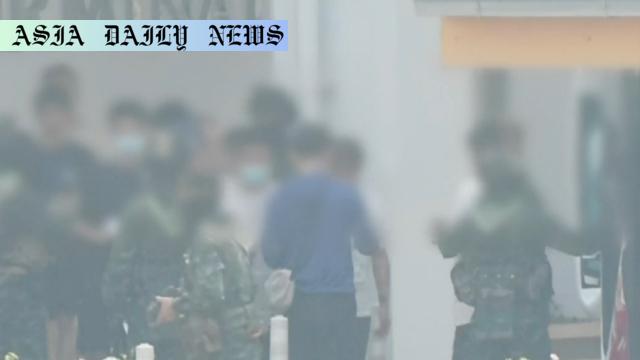Myanmar militia raids KK Park, a hub for scams and trafficking, rescuing many victims and detaining suspects involved in global fraud.
Myanmar’s ethnic minority militia BGF raided KK Park, a known hub for scams and trafficking.
Foreign nationals were freed, while suspects, including Chinese nationals, were detained.
Human trafficking and scam networks are targeted for subsequent raids, expanding the crackdown.

Introduction: Myanmar Militia’s Strategic Operation
In a significant operation, an ethnic minority militia from Myanmar, the Border Guard Force (BGF), carried out a raid on a transnational scam hub known as KK Park. Located in the eastern part of the country near the Thai border, the site gained notoriety as a center for human trafficking, online scams, and other criminal activities. The raid marks a crucial step in combating fraud and human exploitation in the region.
Details on KK Park and Its Illicit Activities
KK Park has long been identified as a hotspot for coordinated criminal enterprises. Controlled by powerful Chinese crime syndicates, this facility has been instrumental in runnings scams targeting victims worldwide. Investigations revealed that people—including foreigners—were coerced into fraudulent activities, with many held against their will. Among the detained suspects were Chinese nationals believed to be orchestrating these schemes. Victims, thought to include individuals from countries like Japan, were released during the operation.
The Scope of Scams and Human Trafficking
Human trafficking networks operating out of KK Park highlight the deep-seated corruption and organized crime prevalent in the area. Victims were reportedly subjected to harrowing conditions, with little freedom and mounting pressure to fulfill fraudulent tasks. These operations not only exploited vulnerable individuals but also tarnished global trust in online platforms and cross-border communication networks.
International Implications and the Militia’s Commitment
The impact of KK Park’s shutdown resonates beyond Myanmar’s borders. Fraudulent activities conducted here targeted victims worldwide, with citizens of multiple countries falling prey to schemes. The Myanmar militia’s bold stance against such centers demonstrates its commitment to clamp down on transnational crime. According to reports, the BGF intends to extend its operations to raid other hubs, signaling an intensified campaign against these nefarious networks.
Challenges in Combating Cross-Border Crime
The raid draws attention to the significant resources and diplomatic efforts required to address crime syndicates operating at an international scale. Coordinated scams often involve multiple jurisdictions, making enforcement and prosecution a complex task. Despite these challenges, actions like the BGF’s efforts lay the groundwork for regional collaboration in dismantling such operations.
Hope for Victims and Global Cooperation
For the victims involved, the raid represents a chance at freedom and justice. Survivors of trafficking and fraud networks often face deep trauma, requiring long-term support and rehabilitation. Meanwhile, the international community must strengthen partnerships to ensure the eradication of such crime centers worldwide. Transparency, intelligence sharing, and firm legal action remain integral to combating organized crime globally.
Conclusion
The raid carried out by Myanmar’s BGF at KK Park sends a strong message against transnational crime and human trafficking. It offers hope for victims, accountability for perpetrators, and a model for future operations against crime hubs. As the international community takes note, there is anticipation for increased collaborative efforts designed to dismantle these global networks and protect vulnerable individuals from exploitation.



Commentary
The Courage of Myanmar’s Militia
Myanmar’s Border Guard Force has demonstrated exceptional bravery and resilience through its action against criminal hubs such as KK Park. In a region often plagued by organized crime and under-resourced law enforcement, this operation stands as a testament to the determination to bring justice and order. It speaks volumes about the risks taken by those on the frontlines in the fight against global scams and human trafficking.
The International Ripple Effect
What transpired at KK Park is not just a local issue—this operation exposes the interconnected nature of transnational crime. Fraudulent schemes orchestrated here affected individuals worldwide, including in countries far from Myanmar. The raid underscores the necessity for cross-border cooperation, where governments and legal bodies unite to tackle the root of such crimes. Without such alliances, combating crime syndicates will remain an uphill battle.
The Plight of the Victims
It is vital to remember the human cost behind these crimes. Those coerced or trafficked into facilities like KK Park are often stripped of their freedom and dignity, subjected to exploitation on numerous levels. The raid offers them a lifeline, but their journey toward recovery is only beginning. Comprehensive support systems must be put in place for their rehabilitation and reintegration into society.
A Call For Proactive Enforcement
The successful raid on KK Park should inspire other nations and entities to adopt a proactive stance against organized crime. Prevention, rather than reaction, must become the global standard. By identifying high-risk zones, allocating resources efficiently, and fostering multi-stakeholder collaborations, nations can stem the rise of such criminal enterprises early on.
Ultimately, the raid reflects a beacon of hope in the battle against crime and exploitation. It is a reminder of the good that can emerge when communities, authorities, and nations work together to uphold justice and protect the vulnerable.